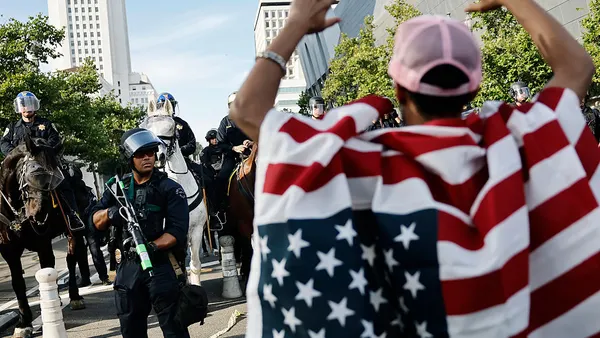Dive Brief:
- Racial justice leaders drafted a report advising Starbucks on overcoming racial discrimination and building a culture of inclusion. The report, "Toward a Vision for Racial Equity & Inclusion at Starbucks: Review and Recommendations" by Sherrilyn Ifill of the NAACP Legal Defense and Educational Fund, Inc. and Heather McGhee of Demos, responded to Starbuck's all-staff, half-day, anti-bias training session in May. The training stemmed from the arrest of two black men after a former employee (who worked for the chain at the time of the incident) called the police because they hadn't made a purchase. Ifill and McGhee said they were asked by Starbucks then-Chairman and Founder Howard Schultz to advise Starbucks on how to address racial bias in April.
- The report's analysis spreads across a variety of angles, including recommendations on the training itself, ways to work beyond the original training and more generally how Starbucks could change to create a "full-scale racial equity overhaul of an organization."
- The authors said in the report they hope other corporations will consider ways to address racial bias and foster inclusion in their workplaces. Some of the report's suggestions include: 1) conducting audits on civil rights and consumer profiling; 2) making corporate leadership more diverse; 3) ensuring that frontline workers have equity and economic security; 4) changing the company's policy manual; 5) making future training goal-oriented; 5) deepening community ties; 6) addressing Starbucks' impact on gentrification and residents' displacement; and 7) positively influencing policing practices in communities across America.
Dive Insight:
Employers that take bold initiatives to confront racial bias may create a ripple effect that helps other organizations. When the original incident occurred, Starbucks didn't cover up the arrest, defend the employee who called the police or deny the incident happened. Instead, Starbucks publicly acknowledged the incident, issued a mea culpa statement and announced the first step in addressing the problem, which was the company-wide half-day training session.
However, bias is too complex for a single training alone to make a sustainable change, a fact the many observers called out in the wake of the Starbucks training. The report recommends that employers make a comprehensive cultural shift, whereby inclusion becomes a key aspect of all major operations, including hiring, leadership selection, customer service and community involvement, and multiple studies support that viewpoint.
It's essentially impossible to erase bias, according to experts, but it is possible to reduce its effects on decision-making. Combating bias requires HR leaders to take initiative. Awareness and mindfulness combined with solid company policies and practices may help mitigate the effects of bias, but real commitment and an authentic interest in creating change are critical for efforts to succeed.












